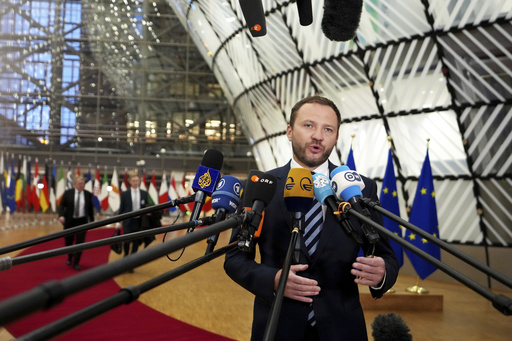
BRUSSELS — On Monday, European Union member states outlined the prerequisites for potentially lifting sanctions against Syria and initiating humanitarian aid for the war-torn nation, following a significant political shift that occurred just over a week ago. The discussions among the EU’s chief diplomats held in Brussels focused on seeking assurances from Syria’s interim government regarding their commitment to establishing a peaceful political environment that includes all minority groups, explicitly excluding extremism and the influence of Russia and Iran.
After the seizure of power on December 8, which resulted in the fleeing of Bashar Assad to Moscow, Syria’s transition has surprisingly proceeded without major incident. There have been minimal reports of retaliatory violence or sectarian strife, with looting and destruction effectively managed. However, there is still an absence of a clearly defined plan for the governance of Syria from the new leadership, which comprises former opposition forces affiliated with the Islamic militant group Hayat Tahrir al-Sham (HTS), classified as a terrorist organization by the EU and the U.S.
The interim government is expected to maintain control until March, during which Arab foreign ministers have advocated for United Nations-supervised elections under a new constitutional framework. The U.N. envoy to Syria has also called for the removal of sanctions in this context. To gain further insights, the EU plans to send a representative to Damascus to engage in discussions with the current authorities.
Kaja Kallas, the EU’s foreign policy chief, expressed the organization’s desire for a “stable, peaceful, and inclusive government” while acknowledging the lengthy process that lies ahead. She noted, “Syria faces an optimistic, positive, but rather uncertain future, and we have to ensure that this goes in the right direction.” Kallas stressed the importance of actionable outcomes over mere verbal commitments, particularly in terms of the new leadership’s approach.
She issued a clarion warning to the new leaders, suggesting that “Russia and Iran are not your friends” and highlighting their diminishing support for Assad, indicating a shift in focus elsewhere amidst their own challenges. Over the course of five decades under the Assad family, Syria has experienced devastation, with widespread poverty, rampant inflation, high unemployment, and pervasive corruption. This tumultuous environment has prompted millions to flee the country, with many residing in Europe.
Some EU nations have temporarily halted asylum applications from Syrians, and current efforts to assist potential returnees focus only on those expressing willingness to go back home. The European Union imposed sanctions in 2011, implementing asset freezes and travel bans targeting Syrian officials and entities responsible for the violent suppression of civilian demonstrations, which ultimately ignited a civil war. To date, these sanctions have affected approximately 316 individuals and 86 organizations supporting the Assad regime.
French Foreign Minister Jean-Noël Barrot emphasized that before any lifting of sanctions or provision of development aid to Syria can occur, specific conditions must be satisfied. These include facilitating a political transition that encompasses representation for all Syrian minority communities, upholding human rights, including the rights of women, and demonstrating a firm rejection of terrorism and extremism.
Spanish Foreign Minister Jose Manuel Albares reiterated the necessity for the Syrian leadership to comprehend the EU’s established “red lines” that must be adhered to before receiving any support. “We should ensure the territorial integrity of Syria and prevent any foreign interference,” he stated, suggesting that successful addressal of these concerns could reopen discussions regarding sanctions.
Austrian Foreign Minister Alexander Schallenberg also pointed out that the EU’s support should not be an unconditional commitment. He stressed that there should be no expectation for the bloc to lift all sanctions and economic restrictions in advance of negotiations. Similarly, Dutch Foreign Minister Caspar Veldkamp remarked on the desire for the removal of Russian military presences in Syria, further underscoring the cautious approach the EU is adopting in its dealings with the new Syrian leadership.

